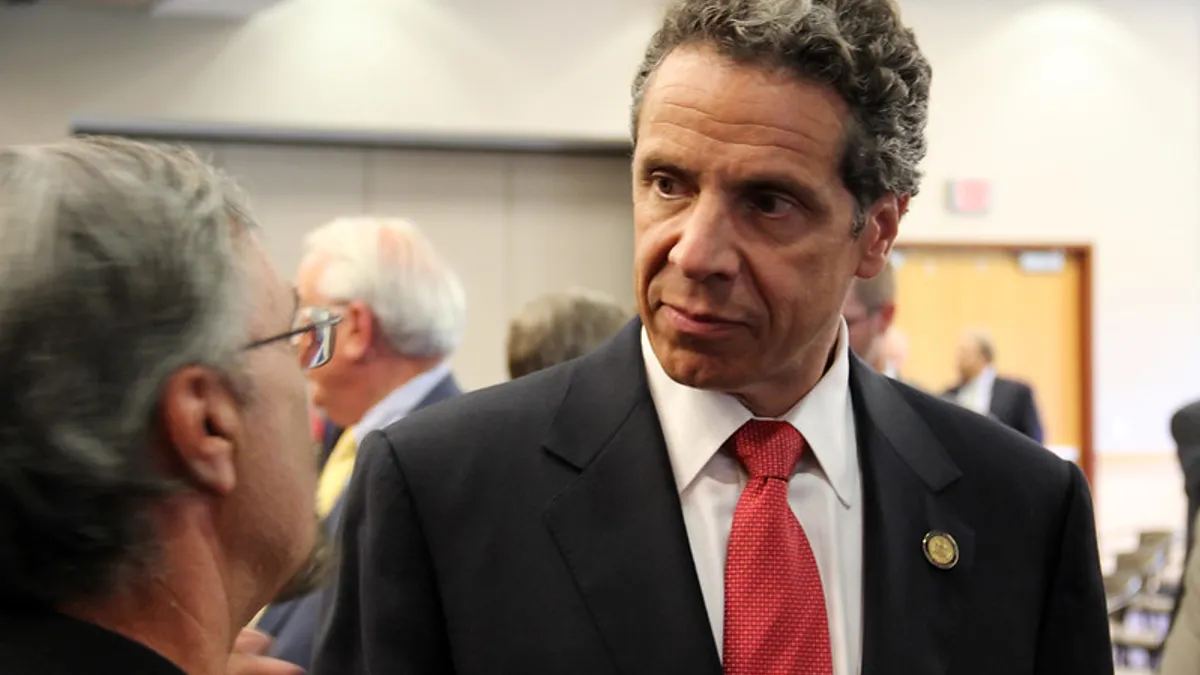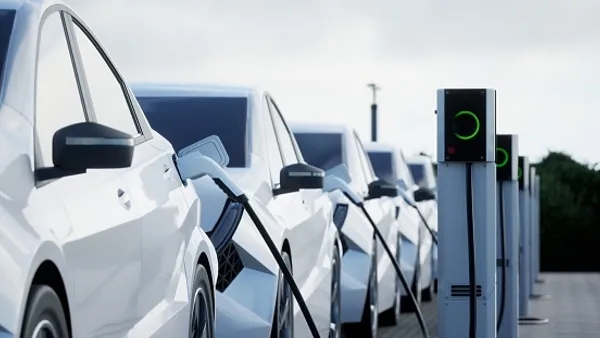Dive Brief:
- New York lawmakers on April 26 passed legislation to require all sales of new passenger cars and trucks in the state be zero emission by 2035. The measure now heads to Gov. Andrew Cuomo, D, to sign or veto.
- A spokesperson for the governor said Cuomo is reviewing the details of the bill. He appears to support its aims, as Cuomo and 11 other governors on April 21 sent a letter asking President Joe Biden to establish a "clear regulatory path to ensuring that all vehicles sold in the United States are zero-emission."
- The New York legislation (S.2758/A.4302) would also require sales of medium and heavy-duty trucks to be zero-emission by 2045, but some electrification advocates say this is not fast enough. "We would actually like to see a more aggressive timeframe," said Kathy Harris, clean vehicles and fuels advocate at the Natural Resources Defense Council (NRDC).
Dive Insight:
If Cuomo signs legislation banning the sale of internal combustion engine passenger vehicles, "it will be a really great first step," said Harris. But eliminating emissions from the transportation sector will ultimately require development of a broader EV marketplace including charging infrastructure.
"The transportation sector is the largest source of greenhouse gas emissions in the U.S. and New York," said Harris, "so moving towards this goal of fully electrified vehicles will help them improve air qualities and help NY reach goals" set out by state's Climate Leadership and Community Protection Act (CLCPA).
"We need standards in place to help the market achieve these goals," said Harris.
The state is also targeting a carbon-free electricity by 2040 and an 85% reduction in economy-wide emissions by 2050. Powering the transportation sector with clean electricity is a key strategy for the state, say experts.
New York is also considering advanced clean truck rules, said Harris, and is about to launch a rulemaking to align zero emission vehicle (ZEV) mandates with California's program. Cuomo's office said the state is also investing more than $1 billion in ZEVs over the next five years, including for charging infrastructure.
Consolidated Edison, the state's largest utility, said it supports the legislation as it is "consistent" with the CLCPA, which it also supported. The utility has "all-in support for EVs," the company said in a statement. Con Ed is also a founding member of the Zero Emission Transportation Association (ZETA), and said the the legislation is "complementary to that group's EV goals."
ZETA advocates for full electrification of the U.S. transportation sector within the next decade.f
The legislation also appears consistent with the recommendations of a report released Thursday by Advanced Energy Economy, which concludes New York needs to "substantially" boost EV adoption to meet a state goal of having 850,000 ZEVs on the road by 2025.
The state should consider requiring "100% of in-state sales of new passenger cars and trucks be zero-emissions by 2035, 100% of medium-duty and heavy-duty vehicles by 2045, and 100% of off-road vehicles and equipment by 2035," according to the report.
Meeting those goals, the report said would require a host of new policies "such as increasing consumer choice by opening up the state to direct sales and addressing upfront cost barriers by providing consumers with more financial incentives," according to the report, "Electrifying New York," which was prepare for AEE by BW Research Partnership.
New York has ambitious emissions reduction goals, ZEV deployment goals, and now EV sales goals, said AEE Director Ryan Gallentine, who leads the group's transportation work.
"But the state is behind where they need to be on both vehicle deployment and charging infrastructure to meet any of these goals," Gallentine said in an email. State lawmakers have a "real opportunity" to electrify the transportation sector he said, but added, "more must be done at both the regulatory and executive levels to successfully electrify vehicles in the state."
"Because vehicle fleets take years to turn over, those policies must be put in place quickly to meet the ambitious goals," he said.
Lawmakers sponsoring New York's ban on internal combustion engine vehicles said in a statement that they hope the switch to all ZEV sales will actually take place before 2035. The legislation targets 2045 for a total fleet transitions specifies that CLCPA's Climate Action Council and various state agencies, including the Public Service Commission, "accelerate the development of affordable fueling and charging options for zero emission vehicles, with a focus on ensuring access in low-income and economically disadvantaged communities."
NRDC's Harris said the group would like to see heavy-duty trucking electrified by 2040, rather than 2045.
The legislation was sponsored by Sen. Pete Harckham and Assemblyman Steve Englebright, both Democrats.
Shifting to zero-emissions transportation "is the best way to ramp up our fight against climate change,” Harckham said in a statement. "We need to take decisive action right now, and I am heartened that a number of other states have realized this as well."
Gov. Cuomo was joined in his call for a national ZEV standard by the governors of: California, Connecticut, Hawaii, Maine, Massachusetts, New Jersey, New Mexico, North Carolina, Oregon, Rhode Island and Washington.
"Moving quickly towards a zero-emission transportation future will protect the health of all communities," the governors said in their letter. "The proposed investments in the American Jobs Plan can be leveraged even further by a strong regulatory framework and will allow the market for American-made zero emissions vehicles to flourish."
The Biden administration has committed to building 500,000 public chargers and wants to spend $174 billion to grow the adoption of electric vehicles.














